If you’re new to the choral world, you might find some of the terms used a bit unfamiliar.

Don’t worry, I’m here to help! Here’s a glossary of some of the more common choral jargon.
If you’re new to the choral world, you might find some of the terms used a bit unfamiliar.

Don’t worry, I’m here to help! Here’s a glossary of some of the more common choral jargon.
I’m finding it hard to come up with an idea to write about today.

Writing about choirs, harmony singing, vocal technique, etc. seems a little like adding salt to a wound when choirs aren’t able to meet. What shall I write about for the next few months?
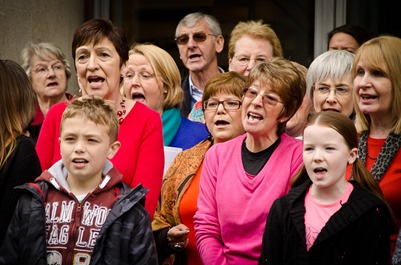

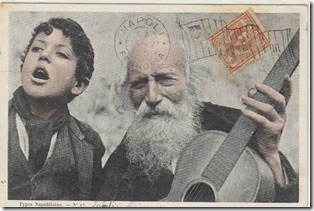
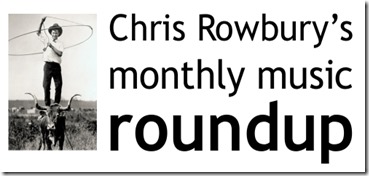
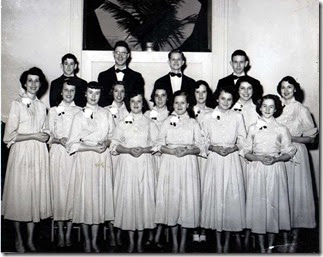
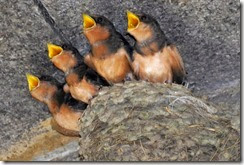


I’m always on the lookout for new ideas for singing workshops.
I’ve pretty much covered all the bases so far: gospel, Eastern European, sacred songs, ABBA, Beatles, Beach Boys, Paul Simon, 60s California, World Music, Sing Africa, Rhythm and Voice, Songs from the British Isles, Men’s harmony singing, Classic Pop, Songs from the 60s, and more ...
I’m running out of ideas, so I thought I’d hand it over to you.

This is a revised version of a post that first appeared as Who is our audience? in July 2007.
I had my final concert with Woven Chords last Saturday. I’ve been leading the choir for the last ten years so it was a rather bittersweet occasion.
Of course, as always, we had hoped for a full house packed with an enthusiastic audience. But we ended up with around 60 keen punters trying very hard to fill the 350-seat auditorium!
As I walked through the audience before the concert started, I was very aware of the sea of grey perms that filled the seats. Our audience was full of “women of a certain age” – again!
The vast majority of our audience at any concert seems to be well over 60 and mostly female. This is also reflected in the choir itself and in the workshops that I run.
Sometimes the choir manage to persuade their children to come along, and almost without exception, they thoroughly enjoy themselves. So why can’t we attract a younger audience?
There’s nothing wrong, of course, with having an older audience, but it would be nice to have a wide spread of ages, genders and nationalities. (This also applies to the choir and workshops: we sing songs from many different countries and cultures, and yet we attract mainly white, middle-class women singers).
Is it perhaps the words “choir” or “concert” which put younger people off? (see Avoiding the ‘C’ word: choir) Do they simply have something better to do on a Saturday night? Is the make-up of our audience simply a reflection of the make-up of the choir? (see Is your audience just friends and family?) In which case, why can’t the choir attract younger people and people from different cultural and ethnic backgrounds? (see Singing across the age divide)
There is a wider question here. It’s not just about trying to get a younger audience, it’s trying to get an audience at all! The fact is that audience numbers are waning for choral concerts, and those who do come to ours tend to be already connected to the choir in some way.
How do we reach more people? When we do manage to persuade people to come, they end up having a great time. But the refrain is often “That’s not at all what I expected!”.
Next week I will be starting a series on Finding an Audience starting with identifying what it is your choir has to offer. Following on from that I’ll look at how we describe what it is we do and how to get that message out there.
What’s your experience? Do you manage to get a wide mix of audience members and healthy numbers?
Somebody asked me the other day if I do workshops on songs from the musicals. I hate musical theatre! So the answer is “no”.
Often people come to singing workshops because they just love to sing. They’ll sing anything, as long as they’re singing. Me, I only like to sing particular kinds of music. I need to love the music before I can sing it. Any old thing just won’t do. So what is it I do like?
A long time ago I fell into harmony singing by encountering full-on songs from the Balkans, then Georgia, and then more generally Eastern Europe. I love klezmer bands, gypsy singing, Balkan brass, middle-Eastern lullabies – all that kind of stuff. Next I discovered the amazing harmony singing from South Africa. Later I moved onto other Southern African countries, then onto the whole of Africa.
I couldn’t get enough of the stuff!
Over the years I’ve focused on unaccompanied harmony singing. The kind of stuff you hear from countries like Bulgaria and South Africa. Some people call it ‘choral singing’, but for me that doesn’t do it justice. The songs I like tend to come from age-old traditions. They’re effectively folk songs. They’re sung in a full-voiced, passionate, open way without artifice.
I know what I mean, but it’s quite hard to pin down because we all have different definitions of the words we use.
I bandy the word ‘harmony’ about. By this I mean usually three or four different parts being sung at the same time. Sometimes the parts are far apart, at other times very close and slightly clashing.
In daily life we use the word ‘harmony’ to mean people getting along and working together, usually doing something similar to each other with some kind of implicit agreement and no conflict. But in singing, that would probably lead to unison singing, or at least only ‘nice’ harmonies. In singing ‘harmony’ means something different.
Then there’s ‘close harmony’. This is when the notes in different parts are close together. Unlike the clashing harmonies in Balkan songs, it usually means that all the parts are close together most of the time. This is the kind of thing you tend to hear in barbershop singing.
Some people don’t like harmonies with lots of ‘holes’ in them (e.g. fifths). They prefer ‘proper’ harmony, as opposed to more rhythmic singing where the parts are quite far apart.
Then there’s ‘acappella’. I try not to use that term. Most of the general public don’t know what it means so I use the phrase ‘unaccompanied singing’ or ‘singing without instrumental backing’. Acappella has come to mean vocal groups singing genres like doo wop and barbershop, or an ‘unplugged’ version of a well-known pop song. Whilst those with a more classical or religious background take it to mean early church singing such as madrigals.
Is what I like ‘choral singing’? Not really as this is most often associated with church singing and/ or more formal, music-reading groups of singers who often focus on choral ‘literature’ and Western classics. The kind of music I love doesn’t tend be sung by ‘choirs’.
I often say that the singing I like comes from the ‘world music’ repertoire. But so many people don’t even know what that means! It was a term invented by record companies to try to promote music that didn’t fit neatly into any of the existing categories. Even if someone does have an idea of what it means, they usually associate it with guitar music from Bali, or the Buena Vista Social Club.
I’ve discovered that it’s hard to explain the kind of singing and songs I’m drawn to. I can’t sing them to people (I can only do one part at a time!), so I need to resort to other reference points (“You know that song that advertises baked beans or German cars?”), or more simply, play an example.
Which is what I’ll do next week. I’ll try to find some good examples of the kinds of singing that I like and give links to them: Now THAT’S what I call singing! Volume 1
I’m going to fess up here: I’ve never really been in a choir.
When I was a kid in Croydon, I sang with a whole bunch of other primary schools in a big concert at the Fairfield Halls.
We sang The Daniel Jazz (music by Herbert Chappell, lyrics by Vachel Lindsay):
“Daniel was the chief hired man in the land, he stirred up the jazz in the palace band”.
I think it was all in unison. I just remember hearing my Dad coughing in the audience (he has a very recognisable cough) and feeling totally embarrassed.
The only other ‘proper’ choir experience I ever had was at the first Sing for Water on London’s South Bank in 2002. Set up by Helen Chadwick, this project began as a mass choir performing as part of the Mayor’s Thames Festival in London to raise money for WaterAid.
Loads of separate choirs and individuals independently learnt the parts to half a dozen songs, then we all congregated in London and sang them together as a single choir. There must have been about 500 singers at the first event.
My own experience then is very limited. As a member of a large choir I found that it was just an excuse to belt out a melody in unison with all the others standing around me. I didn’t really get a sense of the other harmonies as they were too far away.
Which set me wondering: what are the pleasures of being in a choir?
Since I love harmony, I get huge pleasure out of singing with a small group, or standing out in front of a choir, or being in the audience. But I’m not sure what I get out of actually being in the choir itself.
Next week I want to write about the pleasures of leading a choir, but first I’d like to hear about what you get from being in the choir rather than standing outside it.
Many’s the time a choir member will have to sit out a concert due to illness or absence and they are always totally blown away by the sound we make. It’s usually the first time they’ve ever heard the full effect of the harmonies and the quality of the singing. You can’t hear it as well from the inside, and most singers are reluctant to sit out when they can be performing.
Choirs attract so many people these days there is no doubt huge pleasure involved. So my question is this: what are the pleasures to be had from singing in a choir?
Do please drop by and let us know of your own experiences. I’m not asking about the pleasures of singing (we all know them!), but of being in a large choir (say, 40 singers or more).